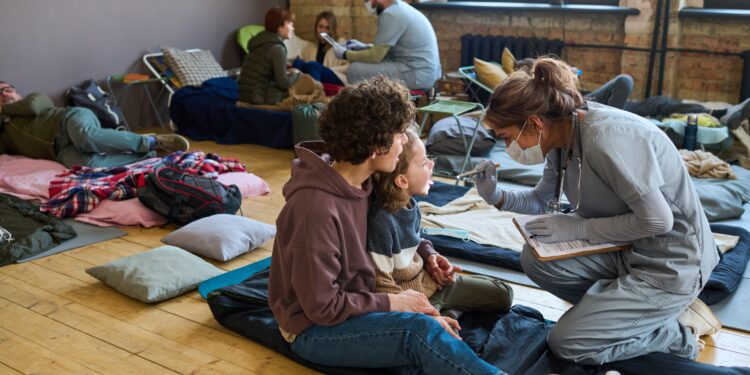Mobile clinics, once a cornerstone of healthcare delivery, are experiencing a resurgence, bringing with them a renewed focus on access to care, health equity, and patient experience. These clinics, often providing low-cost medicine to underserved populations such as the homeless and medically indigent, embody the roots of medicine and medical humanism, emphasizing evidence-based care and personalized approaches.
Mobile clinics play a crucial role in modern healthcare by addressing the pressing issue of access to care. In many areas, particularly rural and underserved communities, people face significant barriers to accessing healthcare facilities. Mobile clinics bridge this gap by bringing medical services directly to these communities, ensuring that individuals receive the care they need, regardless of their location or socio-economic status. This aligns with the goals of the early intervention foundation, which seeks to improve health outcomes by addressing these barriers.
Mobile clinics contribute to health equity by reaching vulnerable populations who often face discrimination and lack resources to seek medical help. Homeless individuals, refugees, and those living in poverty are among the groups that greatly benefit from the services provided by these clinics. By offering affordable or cost-free medical care, mobile clinics address the disparities in healthcare access and improve the overall health outcomes of these communities.
Their role is increasingly recognized in healthcare system management and is supported by various healthcare policies that aim to enhance healthcare insurance coverage for marginalized populations. These innovations in healthcare demonstrate a commitment to all about health, ensuring that modern medical solutions reach those who are most in need. The early intervention foundation principles are evident in this approach, emphasizing the importance of proactive and accessible healthcare services.
These clinics operate on the principle of meeting patients where they are, both physically and mentally. Healthcare providers who work in mobile clinics have the opportunity to develop a deeper understanding of the unique challenges and needs of the communities they serve. This close relationship allows for tailored healthcare interventions that can significantly impact patient outcomes and improve overall health. Early intervention strategies are critical in this context, as they help in identifying and addressing health issues before they become more severe.
Mobile clinics offer several advantages over traditional healthcare facilities. One significant advantage is their flexibility in terms of location. Traditional healthcare facilities are fixed in one place, requiring individuals to travel long distances for medical care. On the other hand, mobile clinics can set up in various locations, making healthcare readily available to communities that may be geographically isolated or lack transportation options. These innovations in healthcare demonstrate a commitment to all about healthcare system and early intervention strategies.
Another advantage is the cost-effectiveness of mobile clinics. These clinics often operate with lower overhead expenses compared to brick-and-mortar facilities, allowing resources to be allocated more efficiently. This cost-effectiveness translates to lower healthcare costs for patients, making vital medical services more accessible to those who may struggle to afford them.
Additionally, mobile clinics provide immediate services. Patients can receive healthcare in a timely manner without the need for appointments or long waiting times. This promptness is particularly crucial in emergency situations or for individuals with chronic conditions who require regular monitoring and care. This approach is supported by the early intervention foundation, which advocates for timely and accessible healthcare interventions.
Mobile clinics have emerged as a crucial solution for improving access to healthcare, particularly in underserved communities. These clinics have revolutionized healthcare delivery by bringing essential medical services to individuals who would otherwise face barriers to receiving care.
One notable way that mobile clinics are enhancing access is through the implementation of telehealth capabilities. With the advancements in technology, mobile clinics can now connect patients with healthcare professionals remotely, breaking down geographical barriers and enabling individuals to consult with doctors from the comfort of their own homes. This innovation in healthcare has proven to be especially helpful for individuals residing in rural areas or those who have limited mobility. Early intervention strategies are enhanced through these telehealth services, providing quicker and more efficient care.
Mobile clinics are increasingly providing specialized programs to cater to the unique healthcare needs of specific populations. From offering prenatal care to outreach programs for mental health, mobile clinics are tailoring their services to meet the diverse needs of communities. By addressing these specific medical requirements, mobile clinics are ensuring that everyone has access to the care they need, regardless of their circumstances. These efforts are aligned with the goals of the early intervention foundation, emphasizing the importance of specialized and accessible care.
To further augment their impact, mobile clinics are actively seeking collaborations with other healthcare providers, organizations, and community partners. By partnering with local hospitals, clinics, and NGOs, mobile clinics can leverage shared resources, expand their services, and reach a wider population. These collaborations are fostering a sense of collective responsibility for healthcare, ultimately leading to a stronger and more resilient healthcare system.
In today’s modern world, access to healthcare is not a privilege, but a fundamental right that every individual should have. Unfortunately, there are still many communities that face significant barriers when it comes to receiving adequate medical care. This is where mobile clinics step in, providing a lifeline for those who are underserved and marginalized.
Mobile clinics have proven to be a game-changer in empowering underserved communities by bringing healthcare directly to their doorstep. These clinics are not only addressing the physical accessibility issues but are also playing a vital role in bridging the healthcare knowledge gap. Many individuals in these communities may not have the necessary information about preventive care, chronic disease management, or even basic health education. Through their on-the-ground presence, mobile clinics are actively engaging with these communities, offering educational programs and raising awareness about health-related issues. This approach is in line with early intervention strategies that focus on education and preventive care.
Additionally, mobile clinics are empowering underserved communities by focusing on preventive care and early intervention. By offering screenings, vaccinations, and regular check-ups, mobile clinics are ensuring that individuals can detect and address potential health concerns before they escalate into more serious conditions. This proactive approach to healthcare is not only improving health outcomes but also reducing the burden on emergency departments and hospitals.
Furthermore, mobile clinics are playing a critical role in addressing health disparities within underserved communities. They are bringing culturally sensitive care to individuals who may face language barriers, cultural stigmas, or discrimination. By understanding the unique needs and challenges of these communities, mobile clinics are able to provide care that is both respectful and inclusive.
In addition to the many benefits that mobile clinics bring to underserved communities, they are also proving to be a cost-effective solution for healthcare delivery. Traditional brick-and-mortar healthcare facilities often come with high overhead costs, including building maintenance, utilities, and staffing. These expenses can be a significant burden, especially for financially constrained communities.
Mobile clinics, on the other hand, offer a more economical approach to healthcare provision. Since they are smaller in scale and can move from one location to another, the operational costs are significantly lower. This allows mobile clinics to allocate more resources towards patient care and essential medical supplies.
The flexibility of mobile clinics enables them to reach areas where establishing a permanent healthcare facility may not be feasible or cost-effective. Rural communities, remote areas, and disaster-stricken regions can greatly benefit from the mobile clinics’ ability to bring healthcare directly to those in need. By eliminating the need for individuals to travel long distances for medical care, mobile clinics are reducing transportation costs and making healthcare more accessible for all.
Another cost-saving advantage is the reduction in emergency room visits and hospitalizations. Through their preventive and early intervention efforts, mobile clinics are helping individuals manage their health conditions effectively. By addressing health concerns before they escalate, mobile clinics are reducing the need for costly emergency medical services and hospital admissions. These early intervention strategies are crucial in managing healthcare costs and improving patient outcomes.
As mobile clinics continue to gain traction in healthcare delivery, it is important to recognize the challenges and future trends in their development. One of the main challenges is securing sustainable funding for mobile clinic operations. While they offer cost-effective solutions, financial stability remains a hurdle that must be addressed through partnerships, grants, and community support.
Maintaining a highly skilled and dedicated workforce is crucial. Mobile clinics rely on healthcare professionals who are committed to serving underserved communities. Recruitment and retention of these professionals, especially in remote areas, require innovative strategies such as incentive programs and professional development opportunities. The early intervention foundation supports these efforts by advocating for skilled and dedicated healthcare professionals.
Technological advancements play a significant role in shaping the future of mobile clinics. With the integration of telehealth services, mobile clinics can provide remote consultations and access to specialists, increasing the range of services offered. Digital health tools, such as remote monitoring devices and electronic health records, can enhance the efficiency and quality of healthcare delivery.
Despite these hurdles, mobile clinics have the power to greatly impact public health initiatives and address community health concerns. By bringing healthcare directly to underserved communities, mobile clinics can bridge the gap in access to quality healthcare. This not only improves health outcomes for individuals but also contributes to reducing healthcare disparities on a larger scale. The principles of the early intervention foundation are reflected in these efforts to improve community health.
Mobile clinics have the unique ability to adapt and respond to evolving community needs. By providing tailored services based on local health concerns, these clinics can play a vital role in disease prevention, health education, and promotion of healthy behaviors.
As we move forward, it is crucial to continue supporting and expanding mobile clinic initiatives. By investing in their success through continued funding, workforce development, and technological integration, we can ensure that healthcare reaches every corner of our society. The early intervention foundation and early intervention strategies will continue to guide these efforts, ensuring that mobile clinics remain a vital part of our healthcare system.















